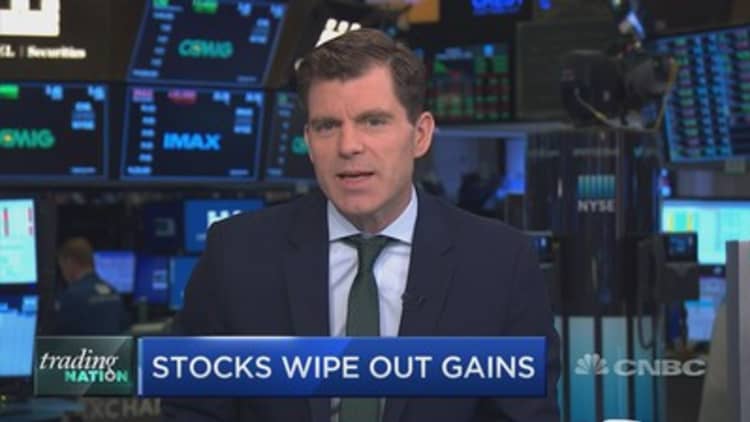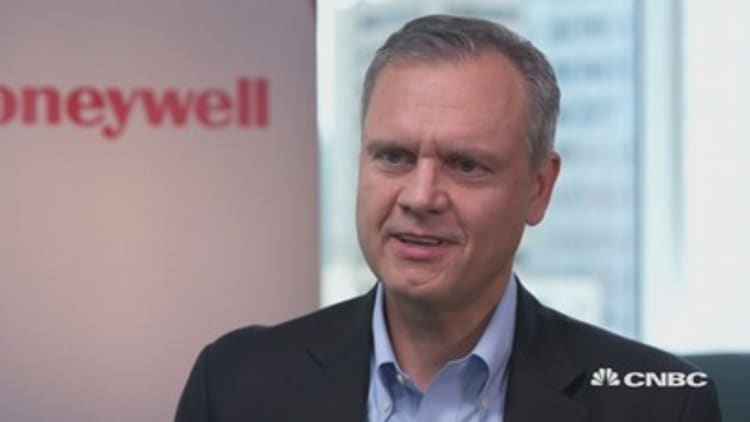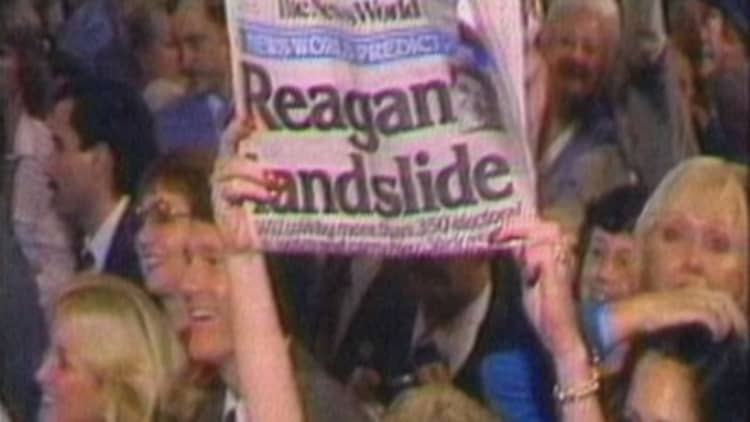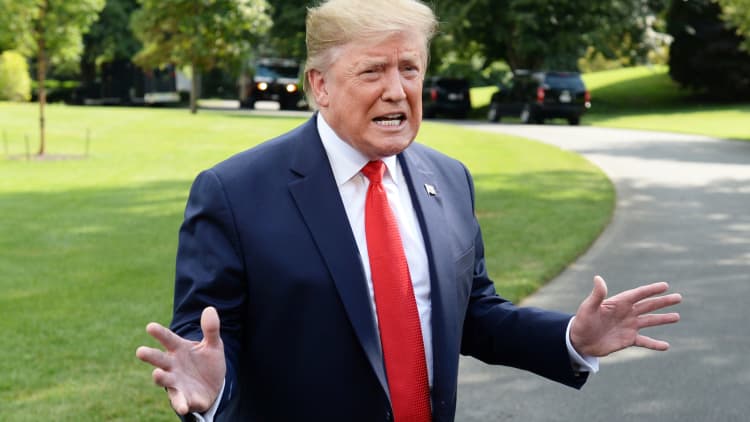Fears about a flagging economy have jumped to the top of President Donald Trump's mind.
As unusual bond market moves have prompted concerns about looming economic trouble, the president said "we are very far from a recession." Trump has pointed to a "strong" U.S. economy — the strongest in the world, he says — held back from soaring growth only by what he calls a "clueless" Federal Reserve and a news media hellbent on feeding the narrative of a downturn.
At the G-7 meetings in France this weekend, he proclaimed the U.S. economy is "the talk of the world!"
Trump has reason to fret. He has built his argument for reelection on American prosperity. His hopes for winning the race may hinge in no small part on stopping the U.S. from tumbling into a recession before November 2020.

Only two presidents since World War II — Democrats Harry Truman and Jimmy Carter — have run for reelection in the same year as a recession. While Truman won and Carter lost, history suggests an economic slump would damage Trump's chances in what will already be a tough 2020 race.
Incumbents have a harder time winning amid a down economy because they need to find other issues to draw voters, said Lynn Vavreck, an American politics and public policy professor at UCLA. Trump is "better positioned than most" to withstand a slowdown because he ran on identity-focused issues like immigration in 2016, "but without a good economy it will be harder for him to swing marginal voters," she said.
Metrics such as the University of Michigan Consumer Sentiment Index help track consumers views' on and expectations for the economy. The metric typically plummets during recessions.
Over the survey's history back to the mid-20th century, it has "largely" found that "if the index is low, the incumbent doesn't get reelected," said Richard Curtin, director of surveys of consumers at the University of Michigan.
Recession fears climbed this month for a variety of reasons. Trade tensions with China exploded Friday: Trump said U.S. companies are "hereby ordered" to find an alternative to operating in the country, and the Trump administration hiked tariff rates on Chinese goods. A day earlier, a key indicator found the manufacturing sector contracted for the first time in 10 years, adding to concerns about the economy.
Meanwhile, corporate profit growth has proven sluggish — though not as bad as some had feared.
Trump may not need to worry just yet. Though some early warning signs of a slowdown have emerged, history suggests it could take until after the election in 2021 for a recession to hit.
U.S. gross domestic product rose a solid 2.1% in the second quarter. On Wednesday, the nonpartisan Congressional Budget Office projected long-term growth of 1.8%, even though it expects Trump's trade conflicts to drag on economic growth. While 1.8% growth is lower than the long-term U.S. historical average, it would comfortably keep the U.S. ahead of a recession.
Uncertainty created by the Trump administration's trade war with China helped to send consumer sentiment lower in August to a level not seen since the beginning of the year, but it still sits well above levels typically seen during recessions. The current sentiment reading would suggest a good case for reelection for an incumbent president, Curtin said.

He notes that Trump's presidency has thrown out some traditional expectations for how voters will react to a president's first term. For instance, views on the economy have become more partisan: Democrats are less likely to have positive feelings about the economy while Trump is in office than they were when Republican President Ronald Reagan was in the White House.
Despite the economy's solid standing now, parts of Wall Street see a rising risk of a recession in the next year. Since the possibility has vexed Trump, CNBC looked back at how other presidents fared while running for reelection under the shadow of a recession.
Truman triumphs, Carter falters
U.S. presidents have rarely run for reelection during a full blown recession since the mid-20th century.
Truman was the first president after World War II to run for a second term during a recession. He did not actually win a first election — he started 1945 as President Franklin Roosevelt's vice president before taking over when the president died only three months into his fourth term.

History best remembers Truman's 1948 victory for the photo of him gleefully holding up a Chicago Daily Tribune newspaper with the headline "DEWEY DEFEATS TRUMAN" — a projection based on the conventional wisdom that Republican New York Gov. Thomas Dewey would beat him. The result is also significant because he won easily despite a recession.
The downturn's timing may explain Truman's success. It did not hit until November 1948, the month of the election, according to the National Bureau of Economic Research.
Not only did Truman comfortably win another term in the White House, but also his Democratic Party flipped control of both chambers of Congress. It gained 75 House seats and nine Senate seats.
Carter did not have the same luck. The brief recession during his reelection year of 1980 started in January and ended in July — four months before Americans cast their ballots, according to NBER.
It followed the 1979 energy crisis, when oil prices spiked and panic about the availability of gasoline spread in the U.S. Carter had encouraged Americans to live more modestly, a push Reagan targeted during his campaign.
Republican Reagan trounced Carter, who won only six states. At the same time, the GOP gained more than 30 House seats and a dozen Senate seats.
A few factors could explain why an election-year recession appeared to hurt Carter and not Truman. Due to how the government reports economic data, it can take months after a recession starts to confirm it.
Voters also may not feel the effects of job losses or lower wages — or a recovery on the other end — until later.
In Truman's case, Americans may not have known the recession started when they cast their ballots. When Carter stood for a second term, they may have had no idea that it ended.
Democrats target Trump's economy

If the economy struggles in the coming months, expect Democrats to use it against Trump as they compete for their party's presidential nomination and in the general election.
During his campaign, Reagan knocked Carter's handling of the economy. In one ad, the Reagan campaign argued the incumbent failed to follow through on his pledge to "lead America to great new heights."
In 3½ years, the dollar has plummeted on the international money markets, new home starts have dropped off to numbers we haven't seen since the Great Depression, millions of American workers find themselves out of work, and confidence in presidential leadership has fallen to the lowest levels in our nation's history.
Democratic presidential contenders have started to hammer Trump even for the growing risk of a recession. Their attacks on his handling of the economy ramped up following the newest shots in the trade war with China on Friday.
Sen. Elizabeth Warren, D-Mass., said Friday that Trump "has no strategy or plan" and his "reckless" actions "threaten the global economy and increase the risk of a recession that will hit working families hardest."
Sen. Kamala Harris, D-Calif., shared a similar message Saturday. She said "Trump's reckless policies and actions are moving our economy toward another recession."
Trump could have a tough time winning another term in the White House even if the economy stays solid. Early polls, both nationally and in swing states, have found him either trailing or barely leading top Democratic presidential candidates.
Of course, polls 15 months away from the election can only say so much. It is unclear now what the economy will look like in November 2020 or even which candidate Democrats will nominate.
At the G-7 on Monday, Trump claimed he did not factor politics into his policy decisions — even as he argued he has an edge in 2020.
"I'm going to run another election. I think I'm winning based on polls that we see. Whether I win or not, I have to do the right thing," the president said.
Leaving the G-7 on Monday, Trump again affirmed how important he considers the economy as he pushes for reelection. While arguing that "we're in a very strong position," he pointed to Walmart's better-than-expected earnings.
"It's a great poll right there, and it's the ultimate poll, how the retailer is doing and how are certain — certain companies doing," he said.
— CNBC's Thomas Franck contributed to this report


